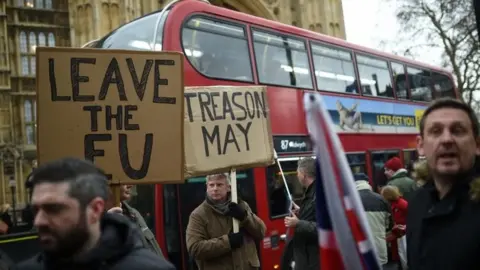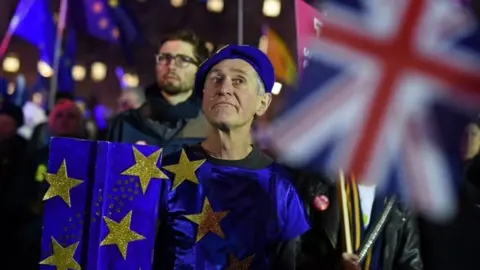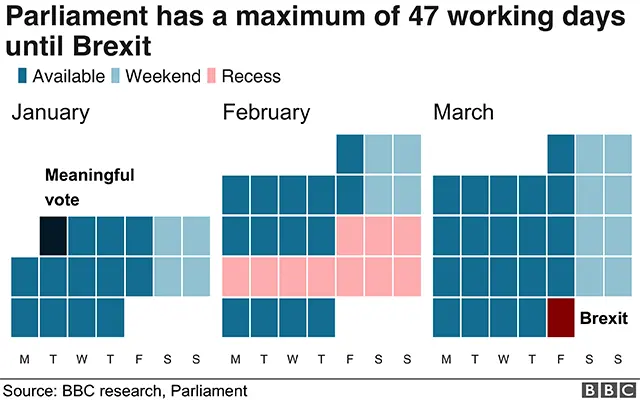Brexit: MPs vote on Theresa May's deal
MPs have begun to vote on Theresa May's Brexit deal for leaving the European Union.
The so-called "meaningful vote" comes at the end of five days of debate over the plan.
Mrs May called for politicians to back her deal or risk "letting the British people down".
But with many of her own MPs expected to join opposition parties to vote against the deal, it is widely expected to be defeated.
Labour, the SNP and Conservative MP Sir Edward Leigh all pulled the amendments that they had proposed to the deal before they came to a vote.
Tory MP John Baron insisted MPs vote on his - which would have given the UK the right to terminate the Northern Ireland backstop without the agreement of the EU - but it was defeated by 600 votes to 24.
Closing the debate on her deal, Mrs May said the responsibility of MPs was "profound" and that her deal "delivers on the core tenets of Brexit... in a way that protects jobs, ensures our security and honours the integrity of our United Kingdom".
But Labour leader Jeremy Corbyn said backing the "botched and damaging" deal would be a "reckless leap in the dark" for the UK.
The prime minister addressed her cabinet on Tuesday morning before heading to the Commons for the start of the debate on her deal - which includes both the withdrawal agreement on the terms on which the UK leaves the EU and a political declaration for the future relationship.
She had spent the lead up to the vote trying to reassure MPs from all sides of the House over the controversial Northern Irish "backstop" - the fallback plan to avoid any return to physical border checks between the country and Ireland - having received new written assurances from the EU that it would be temporary and, if triggered, would last for "the shortest possible period".
Speaking at the close of the debate, Mrs May added: "If we leave with the deal I am proposing, I believe we can lay the foundations for which to build a better Britain.
"And as prime minister I would not stand at this dispatch box and recommended a course of action that I do not believe is in the best interests of our country and our future."
 Getty Images
Getty Images Getty Images
Getty ImagesWith fancy dress, lurid floats and colourful banners, there has been something approaching a carnival atmosphere opposite Parliament, as pro and anti-Brexit demonstrators make their voices heard ahead of the MPs' vote.
A rally by supporters of the People's Vote campaign for another referendum is currently taking place in nearby Parliament Square.
Opening the final day of the debate earlier, Attorney General Geoffrey Cox gave an impassioned speech to the Commons with the prime minister by his side, saying that voting for the deal was "the first of two keys that will unlock our future with the European Union", allowing the government to focus on the future relationship.
He said that MPs could not underestimate the complexity of Brexit and that the deal offered an "orderly, predictable and legally certain" way of leaving the bloc, without "thousands" of legal issues arising for citizens and businesses.
"If you found yourself suddenly with the rug pulled from under you, not knowing what your legal obligations would be, you would say to this House, 'What are you playing at? What are you doing?'
"You are not children in the playground, you are legislators, and it is your job. We are playing with people's lives," he said.
But many remain opposed to the deal, with about 100 Conservative MPs and the DUP's 10 MPs expected to join Labour and the other opposition parties in voting it down.
Mr Corbyn told the Commons: "The prime minister has treated Brexit as a matter for the Conservative Party rather than for the good of the country. But she has failed to even win over her own party.
"This deal is a bad deal for our economy, a bad deal for our democracy, and a bad deal for this country."
Former Brexit secretary Dominic Raab said that Brexiteers like him could back a deal if aspects such as the backstop were dealt with.
But he told the Today programme the EU had played "a smart game of hard ball" and said it was time for the UK to do the same.
Democratic Unionist Party leader Arlene Foster said the backstop "was something that we could not accept" and said her party's MPs would be voting against the deal.
"It (the backstop) does violence to the union - it separates us from the rest of the United Kingdom in a very very obvious way," she said, calling for Mrs May to "get rid" of the backstop.
And speaking during the Commons debate, the leader of the SNP at Westminster, Ian Blackford, reiterated his belief that there was "no such thing as a good Brexit" and his party would continue to fight against leaving.
"There is no way that the Scottish National Party and the people of Scotland are going to be sitting in that bus as the prime minister drives us off the cliff," he said.
EU preparations
BBC Brussels correspondent, Adam Fleming, said the European Commission President Jean-Claude Juncker will be returning to the city later to deal with "Brexit-related business", fuelling speculation Mrs May will make an emergency visit on Wednesday if her deal is voted down.
When asked by the BBC for a message to MPs ahead of the vote, he said: "I would like them to behave in a responsible way."
The EU's chief Brexit negotiator, Michel Barnier, also appealed for MPs to "keep calm" when voting later.
He will be holding talks with the European Parliament's Brexit steering group later tonight in Strasbourg before a debate on Wednesday morning about the result of the meaningful vote.
The deal suffered a heavy defeat in the House of Lords on Monday night, as peers backed a Labour motion by 321 votes to 152.
While the Lords vote carries no real weight, as peers accepted MPs should have the final say, the motion - which also rejected a "no deal" scenario - expressed "regret" that Mrs May's deal would "damage the future economic prosperity, internal security and global influence" of the UK.
However, five Conservative Brexiteer MPs who have been critics of the withdrawal agreement have now said they will support the government, along with three Labour backbenchers and independent Frank Field.
Brexit Secretary Steve Barclay said it showed there had been "progress" but admitted to the BBC's Politics Live that gaining support was "challenging".
Speaking to his own backbenchers on Monday night, Labour leader Jeremy Corbyn again condemned the deal and repeated his call for a general election if it was voted down by Parliament. He also promised Labour would call a no-confidence vote in the government "soon".

What happens next?
If the deal is rejected by MPs, Mrs May has three sitting days to return to Parliament with a "Plan B".
Some have suggested she would head to Brussels on Wednesday to try to get further concessions from the EU, before returning to the Commons to give a statement about her new proposal by Monday. This could then be put to a vote by MPs.
If this also fails, there is a proposal put forward by senior Conservative backbenchers Nick Boles, Sir Oliver Letwin and Nicky Morgan for a "European Union Withdrawal Number 2 Bill". This would give ministers another three weeks to come up with another plan and get it through Parliament.
Allow X content?

If this doesn't work either, they propose giving the responsibility of coming up with a compromise deal to the Liaison Committee - which is made up of the chairmen and chairwomen of all the Commons select committees, drawn from opposition parties as well as the Conservatives.
This proposal in turn would have to be voted through by MPs.
New referendum proposal
In another development, a cross-party group of anti-Brexit politicians has published proposed legislation to bring about another referendum to ask the public whether they want to remain in the EU or leave under the prime minister's deal.
The MPs behind the draft legislation point out that Article 50 - the two-year process by which an EU member can leave the bloc - would have to be extended in order for another referendum to take place, meaning the UK would remain a member beyond 29 March.
But, unless new legislation is introduced, the default position will be that the UK leaves the EU on that date with no deal.
